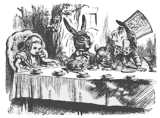The Democracy of Wikipedia

Creating a Wikipedia article was more difficult than I thought. First of all, most of the topics I wanted to write on already had entries. I really wanted to create a new entry so I had to dig deep. I actually ended up creating an entry which I added to a fairly lengthy entry on Edinburgh, Scotland. It describes a company which operates ghost and history tours on and around The Royal Mile. After reading through the Wikipedia ‘rules’, I decided that this was probably an advert and would be removed. Just to see what would happen, I posted it anyway. There wasn’t really a category under which the entry fit, so I gave the page a new sub-heading -Walking Tours- which is now situated between Festivals and Celebrations. We’ll see how long it lasts.
Wikipedia really is an interesting concept; a free online source that can be edited and contributed to by the general public. The potentially stable version of Wikipedia which has been suggested could possibly be the best of both worlds: a stable or permanent entry, monitored by experts and serving as the authoritative entry, and an ‘open’, collaborative version which can be contributed to by the general public. This concept fits the idea in Public History that scholarship and research should be collaborative. Now I am in no way suggesting that my ghost tour entry is scholarship, but it could be used as a starting point for research on a number of topics. And what could be more collaborative than an open- source document which could be edited by anyone?
I fully expect that my entry will be removed or at the very least edited down and relegated to the bottom of the page. I guess Rosenzweig would approve because he would find this type of editing highly democratic. All this editing of Wikipedia is a good example of how experts can collaborate with non-experts further knowledge. For example, in the article”What’s for Dinner”, Mills T. Kelly explains the effect of new research on an article in Wikipedia.. An entry on the Donner Party stated as a fact that cannibalism had been practiced. After new research had been discovered an entry was posted by who had looked at the work of two respected historical archaeologists. The archaeologists found no physical proof of cannibalism in the Donner camps. Kelly posted changes to the original entry and his entry was subsequently modified. Why is this important? Because the modification included some qualifications. The new author of the entry did not state with absolute certainty that cannibalism had been practiced. What does all of this prove? Perhaps that there is a role for experts in an open-source era and that they can have influence when it comes to instruction and critical thinking.
Rosenzweig in his article, “The Road to Xanadu: Public and Private Pathways on the History Web”, asserts that there should be more effort in democratizing than providing instruction to give meaning. Mills Kelly’s Donner Party example would re-enforce the idea that an aggregate of multiple voices, expert and non-expert, does provide for a re-examination of principles and issues in history.
Speaking of re-examining, it looks like I’ll have to do that; my entry has been removed.


